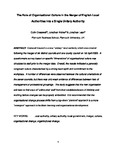The Role of Organisational Culture in the Merger of English Local Authorities into a Single Unitary Authority
| dc.contributor.author | Cresswell, C | |
| dc.contributor.author | Moizer, Jonathan | |
| dc.contributor.author | Lean, Jonathan | |
| dc.date.accessioned | 2015-09-06T12:03:29Z | |
| dc.date.available | 2015-09-06T12:03:29Z | |
| dc.date.issued | 2014-01-01 | |
| dc.identifier.issn | 0300-3930 | |
| dc.identifier.issn | 1743-9388 | |
| dc.identifier.uri | http://hdl.handle.net/10026.1/3539 | |
| dc.description | This is an Accepted Manuscript of an article published by Taylor & Francis in Local Government Studies on 18/07/2013, available online: http://wwww.tandfonline.com/10.1080/03003930.2013.787413 publicationstatus: published | |
| dc.description.abstract |
Cornwall Council is a new ‘unitary’ local authority which was created following the merger of six district councils and one county council on 1 April 2009. A questionnaire survey based on specific ‘dimensions’ of organisational culture was circulated to staff prior to the merger date. Overall, the results indicated a generally congruent culture characterised by a strong team spirit and commitment to the workplace. A number of differences were observed between the cultural orientations of the seven councils, but there was only weak evidence of differences between tiers of management or professional groupings. The study suggests that the new organisation will have to find ways of ‘unfreezing’ staff from their established ways of thinking and working before changes can be properly embedded. It is recommended that the organisational change process shifts from a top-down ‘planned’ approach to a more ‘emergent’ approach to facilitate learning and organisational development. | |
| dc.format.extent | 356-379 | |
| dc.language | en | |
| dc.language.iso | en | |
| dc.publisher | Taylor & Francis Online | |
| dc.subject | Local authority | |
| dc.subject | unitary authority | |
| dc.subject | local government | |
| dc.subject | merger | |
| dc.subject | culture | |
| dc.subject | organisational change; organizational change | |
| dc.title | The Role of Organisational Culture in the Merger of English Local Authorities into a Single Unitary Authority | |
| dc.type | journal-article | |
| dc.type | article | |
| plymouth.author-url | https://www.webofscience.com/api/gateway?GWVersion=2&SrcApp=PARTNER_APP&SrcAuth=LinksAMR&KeyUT=WOS:000337245600003&DestLinkType=FullRecord&DestApp=ALL_WOS&UsrCustomerID=11bb513d99f797142bcfeffcc58ea008 | |
| plymouth.issue | 3 | |
| plymouth.volume | 40 | |
| plymouth.publisher-url | http://www.tandfonline.com/doi/pdf/10.1080/03003930.2013.787413 | |
| plymouth.publication-status | Published | |
| plymouth.journal | Local Government Studies | |
| dc.identifier.doi | 10.1080/03003930.2013.787413 | |
| plymouth.organisational-group | /Plymouth | |
| plymouth.organisational-group | /Plymouth/Faculty of Arts, Humanities and Business | |
| plymouth.organisational-group | /Plymouth/Faculty of Arts, Humanities and Business/Plymouth Business School | |
| plymouth.organisational-group | /Plymouth/REF 2021 Researchers by UoA | |
| plymouth.organisational-group | /Plymouth/REF 2021 Researchers by UoA/UoA17 Business and Management Studies | |
| plymouth.organisational-group | /Plymouth/Users by role | |
| plymouth.organisational-group | /Plymouth/Users by role/Academics | |
| dc.identifier.eissn | 1743-9388 | |
| dc.rights.embargoperiod | Not known | |
| rioxxterms.versionofrecord | 10.1080/03003930.2013.787413 | |
| rioxxterms.licenseref.uri | http://www.rioxx.net/licenses/all-rights-reserved | |
| rioxxterms.type | Journal Article/Review |


